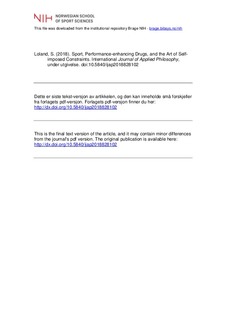Sport, Performance-enhancing Drugs, and the Art of Self-imposed Constraints
Journal article, Peer reviewed
Accepted version

View/
Date
2018Metadata
Show full item recordCollections
- Artikler / Articles [2119]
- Publikasjoner fra Cristin [1107]
Original version
International Journal of Applied Philosophy. 2018, 32, 87-100. 10.5840/ijap2018828102Abstract
Should the use of performance-enhancing drugs (PED) be banned in sport? A proper response to this question depends upon ideas of the meaning and value of sport. To a certain extent, sport is associated with ideal values such as equality of opportunity, fair play, performance and progress. PED-use is considered contrary to sport. On the other hand, critics see sport as an expression of non-sustainable and competitive individualism that threatens human welfare and development. PED-use is considered a logical consequence of sport values. I challenge both views as simplistic and inadequate. I develop what I refer to as the normative structure of sport consisting of self-imposed constraints at three levels: in the formal rules, in norms for fair play, and in the interpretation of athletic excellence as a morally relevant instantiation of human excellence. I argue that the question of a ban on PED should be discussed at the third level and depends upon interpretations of athletic excellence as a form of human excellence. I conclude that, in the current situation of elite sport, proponents of a ban on PED seem to have the strongest arguments.
Description
I Brage finner du siste tekst-versjon av artikkelen, og den kan inneholde ubetydelige forskjeller fra forlagets pdf-versjon. Forlagets pdf-versjon finner du på www.pdcnet.org / In Brage you'll find the final text version of the article, and it may contain insignificant differences from the journal's pdf version. The definitive version is available at www.pdcnet.org